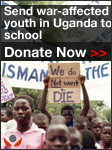Moving towards Peace
Rugunda to meet Otti
The Minister of Internal Affairs, Dr. Ruhakana Rugunda, will lead a government team to meet the LRA deputy, Vincent Otti and other rebel commanders at Ngomo-romo at a date yet to be set. The former minister for northern Uganda pacification, Betty Bigombe, who is currently spearheading peace talks between the LRA and the Government, is set to shift her base today from Gulu to Ngomo-romo, which is outside the ceasefire zone. According to security sources in Gulu district, Bigombe will leave the comfort of Acholi Inn to stay in a tent at Ngomo-romo in Lukung sub-county in Lamwo county, 3km from the Sudan border to meet the LRA leaders. Security sources said Otti was heading towards Uganda after their meeting with his boss, Joseph Kony, in southern Sudan. President Yoweri Museveni recently extended the ceasefire up to southern Sudan to provide a safe corridor for Otti to consult Kony on a way forward for the peace talks initiative. Sources said the security of the peace team would be guaranteed at Ngomo-romo. Bigombe was on Monday holding a series of peace meetings with traditional leaders led by Rwot David Onen Acana II and the military to see how they would travel on Tuesday to meet the LRA leaders. Kitgum RDC Lt. Santo Okot Lapolo said he was aware that Rugunda and Bigombe were to meet the LRA chiefs at Ngomo-romo before December 23. Lapolo accused the rebels of violating the ceasefire by looting food from garden of civilians living in camps, citing Padibe camp as the most affected. “We are going to deploy heavily around the camps and the gardens in order to protect the civilians and their food,” Lapolo said. Bigombe returned to Gulu from Kampala on Sunday. Meanwhile, the regional army spokesman, Lt. Paddy Ankunda, said a group of LRA fighters under the command of Brigadier Lakati and Major Bogi re-entered the ceasefire zone on Sunday. Ankunda dismissed rumours that the UPDF was still occupying the ceasefire zone and had continued to attack the rebels who had gathered there to await the outcome of the peace talks. “We have never attacked any rebels inside the ceasefire zone since the peace talk consultations started on November 15. “We don’t intend to disrupt this peace imitative. We are giving every act of the LRA a benefit of doubt and we are not about to attack any rebel within the permanent peace-talk zone,” Ankunda added. The Government recently extended the ceasefire to December 31 to allow direct talks with the rebel commanders.

